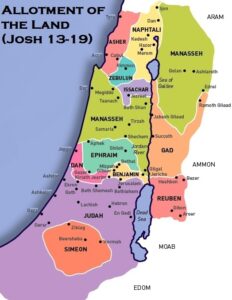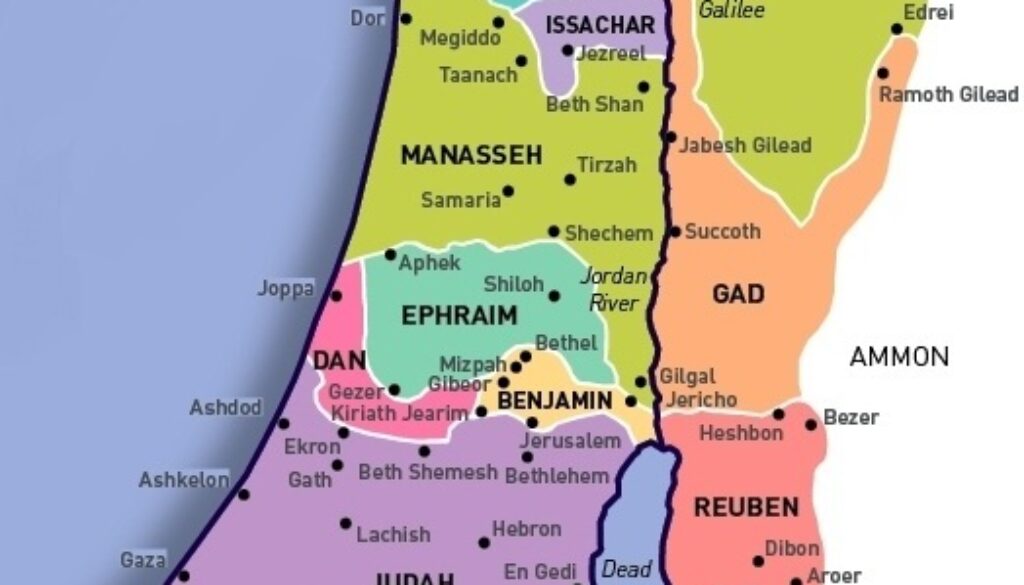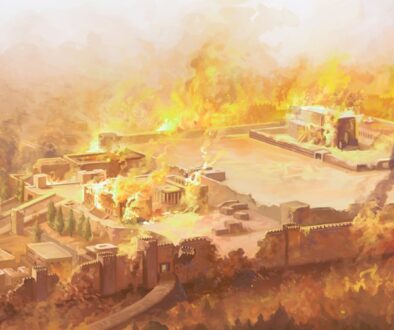Joshua Divided Up

Israel has conquered 33 kings so far. It is time that the land is divided up. Two and a half tribes already have their allotment. Nine and a half to go.
Not all of the Promised Land has been conquered. God told Moses that He would remove the people in stages. Otherwise the land would grow wild. But the allotments that are given take in the WHOLE territory, conquered or not. And this division process doesn’t happen all at once.
We are going to do a ‘hop, skip and a jump’ journey through this part of Joshua. There is no way I can accurately include all the boundaries of the territories without getting lost, so that portion is going to be left for you to explore; if you so choose. I’m also not going to go into detail with the cities given to the Levites and which were “cities of refuge” for those who accidentally killed someone.
What I do want to look at is the process by which Israel received the land. The parts where the people are interacting. This part spans quite a bit of time. I’m going to condense it a LOT. With that said, let’s join Israel as they receive what the Lord has promised them.
♥ ♦ ♥
Joshua is getting up there in years. He has been leading Israel for over five years, as they battle against the inhabitants of the land. Joshua was not young when the mantle was passed to him, but he didn’t lack strength to complete whatever he was called on to do. He fought well in battle, had a quick mind for strategy, and a willing heart that kept itself in tune with the Lord.
Much of the land of Canaan has been conquered by Israel. But there still remains many places where Israel hasn’t driven the people out. EVERYWHERE that Israel has attacked has been taken. Since dealing with the sin of Achan, they have not suffered a single defeat. Better still, they suffered very few casualties in all their battles. The Lord has truly been fighting on their side.
Joshua is relaxing by his tent. It has been a week since Israel returned from her last battle. No one is forming coalitions to fight against them. It is quiet for a change. Joshua is contemplating what comes next when the Lord speaks to him.
“You are old and advanced in years, and there remains yet very much land to possess. This is the land that yet remains: all the regions of the Philistines, and all those of the Geshurites (from the Shihor, which is east of Egypt, northward to the boundary of Ekron, it is counted as Canaanite; there are five rulers of the Philistines, those of Gaza, Ashdod, Ashkelon, Gath, and Ekron), and those of the Avvim, in the south, all the land of the Canaanites, and Mearah that belongs to the Sidonians, to Aphek, to the boundary of the Amorites, and the land of the Gebalites, and all Lebanon, toward the sunrise, from Baal-gad below Mount Hermon to Lebo-hamath, all the inhabitants of the hill country from Lebanon to Misrephoth-maim, even all the Sidonians. I myself will drive them out from before the people of Israel. Only allot the land to Israel for an inheritance, as I have commanded you. Now therefore divide this land for an inheritance to the nine tribes and half the tribe of Manasseh.” (Joshua 13:1-7)
Joshua breathes deeply. “I am old. So, I guess I better get to it before it’s too late.” Joshua rises from his seat so that he can go to the Tabernacle and share the Lord’s words with the people. Before setting off though, he goes into his tent to gather his map of the territory. He will need this when portioning out the land.
Joshua brings his map and writing instruments to the Tabernacle. He greets Eleazar as he enters.
“Shalom Eleazar. The Lord has called me to divide up the land for the tribes.”
Eleazar nods and smiles. “Would you like me to summon the elders of the tribes?”
“Yes please” answers Joshua as he sets up his map.
Once everyone is assembled, Joshua begins.
“The Lord has given us rest; at least for a time. He has instructed me to divide the land. Those of you who are ready now, I will work with you first.”
Caleb steps up and the leaders of Judah follow him.
“Shalom Caleb. Are you here on behalf of Judah?”
“I am, but I am here on my own behalf also.”
Joshua nodded his head and held out a hand towards Caleb, indicating that he should go on.
“You know what the Lord said to Moses the man of God in Kadesh-barnea concerning you and me. I was forty years old when Moses the servant of the Lord sent me from Kadesh-barnea to spy out the land, and I brought him word again as it was in my heart. But my brothers who went up with me made the heart of the people melt; yet I wholly followed the Lord my God. And Moses swore on that day, saying, ‘Surely the land on which your foot has trodden shall be an inheritance for you and your children forever, because you have wholly followed the Lord my God.’ And now, behold, the Lord has kept me alive, just as he said, these forty-five years since the time that the Lord spoke this word to Moses, while Israel walked in the wilderness. And now, behold, I am this day eighty-five years old. I am still as strong today as I was in the day that Moses sent me; my strength now is as my strength was then, for war and for going and coming. So now give me this hill country of which the Lord spoke on that day, for you heard on that day how the Anakim were there, with great fortified cities. It may be that the Lord will be with me, and I shall drive them out just as the Lord said.” (Joshua 14:6-12)
“I do remember this conversation. And you have chosen well for yourself. I’m assuming that, since the leaders of Judah are here with you, they have a request as well?”
“We have, my lord. We would like territory in the southern portion. And, as we have the largest tribe, we would ask for an allotment appropriate to our numbers.”
“This is a fair request. Step over here with me, so that we may mark this down.” Joshua’s hand is guided by the Lord as he marks out a portion for Judah. “Here is what I will give you…” The territory that Joshua described to them included 115 different cities. It was a very large territory indeed.
Joshua laid his quill down and waited. He didn’t have to wait long. The people of Joseph came to him next.
“We would like to speak with you about our inheritance in the land.”
“Did you have something in particular you were asking for?”
The leaders looked at one another before speaking. “We would like to receive our portion from the heart of the Promised Land.”
Joshua nodded his head “Step with me over to the map and we will mark out your inheritance.” The hand of the Lord again guided Joshua as he drew the portions for the descendants of Joseph. “This portion will be for you to dwell in.”
Before Joshua laid his quill down, the daughters of Zelophehad had a request to make. “The Lord commanded Moses to give us an inheritance along with our brothers.”
“That he did” remarked Joshua. “You shall indeed have a portion of your own, withing the land allotted to Manasseh as an inheritance.”
But the people of Joshep were still not happy with what Joshua had allotted them. “Why have you given me but one lot and one portion as an inheritance, although I am a numerous people, since all along the Lord has blessed me?” (Joshua 17:14)
Joshua looked at them with a bit of shock. The portion he had given them was plentiful, as well as being expandable. “If you are a numerous people, go up by yourselves to the forest, and there clear ground for yourselves in the land of the Perizzites and the Rephaim, since the hill country of Ephraim is too narrow for you.” (Joshua 17:15)
The men looked stricken. How could Joshua not understand. They decided to counter Joshua’s argument. “The hill country is not enough for us. Yet all the Canaanites who dwell in the plain have chariots of iron, both those in Beth-shean and its villages and those in the Valley of Jezreel.” (Joshua 17:16)
Joshua would not be swayed. The Lord had given him these boundaries for the children of Joseph. “You are a numerous people and have great power. You shall not have one allotment only, but the hill country shall be yours, for though it is a forest, you shall clear it and possess it to its farthest borders. For you shall drive out the Canaanites, though they have chariots of iron, and though they are strong.” (Joshua 17:17-18) If they relied on the Lord, they would be able to do this thing.
None of the other tribes stepped forward. Joshua went ahead and dismissed the assembly. Two days later, Joshua called the people together again.
“We are going to set up the Tabernacle in a permanent place. That place is Shiloh. We will leave first thing in the morning.”
Israel set out the next morning with the Tabernacle. This was the last time it would direct the people as to where and when to go. There was an air of celebration throughout the congregation. This was another step in establishing this new land as Israel’s own.
Once the Tabernacle was set up and sacrifices offered to the Lord, Joshua called the people to attention. There was still a matter which needed addressed.
“How long will you put off going in to take possession of the land, which the Lord, the God of your fathers, has given you? Provide three men from each tribe, and I will send them out that they may set out and go up and down the land. They shall write a description of it with a view to their inheritances, and then come to me. They shall divide it into seven portions. Judah shall continue in his territory on the south, and the house of Joseph shall continue in their territory on the north. And you shall describe the land in seven divisions and bring the description here to me. And I will cast lots for you here before the Lord our God. The Levites have no portion among you, for the priesthood of the Lord is their heritage. And Gad and Reuben and half the tribe of Manasseh have received their inheritance beyond the Jordan eastward, which Moses the servant of the Lord gave them.” (Joshua 18:3-7)
Men were presented to Joshua right away for the purpose he had described. He gave instructions to them before sending them out.
“Go up and down in the land and write a description and return to me. And I will cast lots for you here before the Lord in Shiloh.” (Joshua 18:8)
The men went all over the land. There was not one place that they left unexplored, even the places that were still occupied by the inhabitants of the land. Each kept a record of everything they saw. They were gone for a full month in their travels. On their final night out, they compiled their reports and broke them down into seven separate sections. They used rivers and hills as dividing lines for the seven territories. Now it was time to give their findings to Joshua.
When the men returned to Gilgal, they were greeted with great fanfare. The people knew that their final destinations lay within their grasps. Joshua was also front and center to welcome them.
“Are we ready, my sons? Did you find out all there is to know about the land?”
“We are and we have, my lord.” The leader of the spies handed Joshua the seven books.
“Let us go to Shiloh. There the Lord will decide for us what is to be done for each tribe. We will leave at first light tomorrow.”
The procession to Shiloh contained the tribal leaders for all the tribes. Those who had already received their inheritance came along as support. They would receive nothing more on this day. The main congregation stayed behind. Their leaders would inform them of their new homes when they returned.
Upon reaching Shiloh, Joshua went to Eleazar and asked him to offer a sacrifice of thanks giving to the Lord. Once the meat was burning on the fire, Joshua called the leaders of the seven tribes forward. Eleazar used the Urim and Thummim to choose first the allotment from among the seven and then the tribe who would receive it.
Benjamin received his first. It was between that of Judah and Manasseh and Ephraim. Simeon received his next. His was in the middle of Judah’s territory. That given to Judah was to large for them to inhabit all of it. Next was an allotment for Zebulun. Then came Issachar, then Naphtali, then Asher, and finally Dan.
Once all the allotments had been given and their boundaries marked out, Joshua was given an inheritance of his own withing his tribe; Ephraim. He asked for, and received, the city of Timnath-serah.
There was still the issue of the Cities or Refuge to be established and cities and pasture land for the Levits. The tribe of Levi would not receive an inheritance in the land because the Lord was their inheritance. But they would receive cities from each of the tribes where they would live their lives among the people.
There were six cities of refuge established. Three on the eastern side of the Jordan and three on the western side. These would be where anyone who killed another person unintentionally could stay for safety. The “Avenger of Blood” could not follow them into the city, nor drag them out. For their own safety, they would remain in that city until the high priest of the time died. Then they would be free to return to their own home.
Joshua named all of these cities for the people. And he called for each tribe to give the Levites cities within their own territories. There was not one tribe that refused this command.
Once all the land was divided and apportioned, Joshua had one final item he needed to deal with. This was to allow the two and a half tribes who received their inheritance on the eastern side of the Jordan to go home. They had fulfilled their vow to Moses and their brothers.
“You have kept all that Moses the servant of the Lord commanded you and have obeyed my voice in all that I have commanded you. 3 You have not forsaken your brothers these many days, down to this day, but have been careful to keep the charge of the Lord your God. 4 And now the Lord your God has given rest to your brothers, as he promised them. Therefore turn and go to your tents in the land where your possession lies, which Moses the servant of the Lord gave you on the other side of the Jordan. 5 Only be very careful to observe the commandment and the law that Moses the servant of the Lord commanded you, to love the Lord your God, and to walk in all his ways and to keep his commandments and to cling to him and to serve him with all your heart and with all your soul.” (Joshua 22:2-5) Joshua also called for the tribes west of the Jordan to share the spoils of battle with the tribes on the eastern side. They had fought valiantly for their brothers.
“Go back to your tents with much wealth and with very much livestock, with silver, gold, bronze, and iron, and with much clothing. Divide the spoil of your enemies with your brothers.” (Joshua 22:8)
After the two and a half tribes crossed the Jordan they got to thinking about how it divided them from their brothers. They were afraid that, some day in the future, those on the western side of the Jordan would claim that they were not of the nation of Israel. So, they set up a marker stone as a witness that they too were part of the nation of Israel. They were one with their brothers.
When the western tribes saw what was going on, they became incensed! They didn’t understand this marker. They believed it was a monument to another god. This could NOT stand! Israel KNEW what following other gods got them; BIG TROUBLE!
All the western tribes gathered at Shiloh, ready to go to war against their brothers, if necessary. Ten leaders from each of the tribes went over the Jordan and spoke to the eastern tribes.
“Thus says the whole congregation of the Lord, ‘What is this breach of faith that you have committed against the God of Israel in turning away this day from following the Lord by building yourselves an altar this day in rebellion against the Lord? Have we not had enough of the sin at Peor from which even yet we have not cleansed ourselves, and for which there came a plague upon the congregation of the Lord, that you too must turn away this day from following the Lord? And if you too rebel against the Lord today then tomorrow he will be angry with the whole congregation of Israel. But now, if the land of your possession is unclean, pass over into the Lord’s land where the Lord’s tabernacle stands, and take for yourselves a possession among us. Only do not rebel against the Lord or make us as rebels by building for yourselves an altar other than the altar of the Lord our God. Did not Achan the son of Zerah break faith in the matter of the devoted things, and wrath fell upon all the congregation of Israel? And he did not perish alone for his iniquity.’” (Joshua 22:16-20)
The tribes of Reuben, Gad, and the half tribe of Manasseh were astonished that their brothers would think this of them. “The Mighty One, God, the Lord! The Mighty One, God, the Lord! He knows; and let Israel itself know! If it was in rebellion or in breach of faith against the Lord, do not spare us today for building an altar to turn away from following the Lord. Or if we did so to offer burnt offerings or grain offerings or peace offerings on it, may the Lord himself take vengeance. No, but we did it from fear that in time to come your children might say to our children, ‘What have you to do with the Lord, the God of Israel? For the Lord has made the Jordan a boundary between us and you, you people of Reuben and people of Gad. You have no portion in the Lord.’ So your children might make our children cease to worship the Lord. Therefore we said, ‘Let us now build an altar, not for burnt offering, nor for sacrifice, but to be a witness between us and you, and between our generations after us, that we do perform the service of the Lord in his presence with our burnt offerings and sacrifices and peace offerings, so your children will not say to our children in time to come, “You have no portion in the Lord.”’ And we thought, ‘If this should be said to us or to our descendants in time to come, we should say, “Behold, the copy of the altar of the Lord, which our fathers made, not for burnt offerings, nor for sacrifice, but to be a witness between us and you.”’ Far be it from us that we should rebel against the Lord and turn away this day from following the Lord by building an altar for burnt offering, grain offering, or sacrifice, other than the altar of the Lord our God that stands before his tabernacle!” (Joshua 22:22-29)
The western tribes were very relieved at the answer they received. “Today we know that the Lord is in our midst, because you have not committed this breach of faith against the Lord. Now you have delivered the people of Israel from the hand of the Lord.” (Joshua 22:31b)
The message of the purpose and name of the monument was carried back to the people at Shiloh. The people of Reuben and the people of Gad called the altar Witness, “For,” they said, “it is a witness between us that the Lord is God.” (Joshua 22:34)
(to be continued)
The land has been divided between the people, but there is still work to do. As one, Israel was unstoppable. But divided up, they are not the same force that they were. Dan even surrenders his territory and grabs a small piece of three cities. They couldn’t drive the people from the land.
I’m wondering if they ran into trouble because of sin, like they did with Ai. We will see Joshua’s last two addresses to the people where he tells them that, if they don’t stay true to the Lord, He will not work on their behalf. Is this why they couldn’t remove all the people?
Those inhabitants were a thorn in Israel’s side and a snare to them by keeping their gods among the people. And we know what happened after that. It took a while, but sin separated Israel from God. Just as the Colorado River cut the Grand Canyon, sin will leave a deep gouge in our heart if not stopped. And it certainly cut a deep chasm between the two halves of Israel in the time of the kings.
Father God, Israel made a great start, but ‘life’ got in between them and You. I have had times when my ‘great starts’ have come to a screeching halt. Forgive me for those times Lord. I want NOTHING between You and me. Keep me walking Your paths, no matter what.
I’m sorry I kept getting sidetracked during our time today, Lord. Thank You for giving me a ‘kick in the pants’ to get started today. I’m glad we had time together; even with all the distractions.
Writing this story was a bit disjointed. I pray that You are able to use it anyway to bless others. I know that there is MUCH MORE to this story than I have been able to put in. I don’t have the knowledge to bring it all out. I leave whatever else You desire to share in YOUR capable hands.




